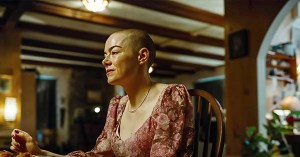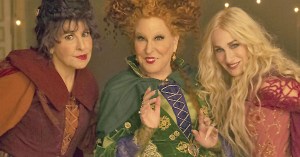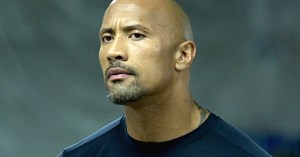Hawkeye’s Fra Fee on Kazi’s Style, His Closeness With Maya, and the Echo of ‘Bro’
Kazi breaks the Tracksuit Mafia mold. The actor who plays the organized crime lieutenant talks about working within the secretive Marvel Cinematic Universe: "The best fun ever."
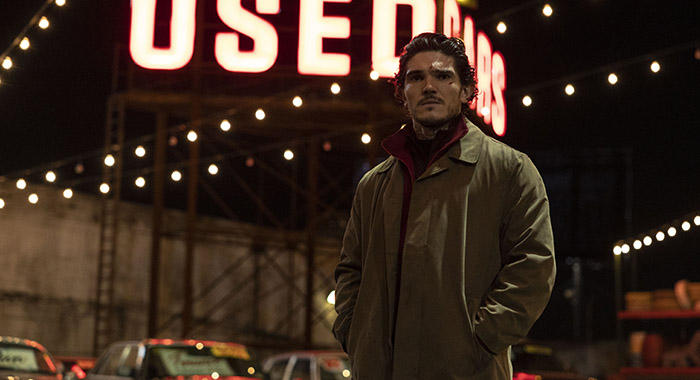
(Photo by Chuck Zlotnick/Marvel Studios)
As the Tracksuit Mafia lieutenant with great hair, Fra Fee’s Kazi has a distinctive profile on Marvel’s Hawkeye series. He is also fairly different from his comic book counterpart, who entered the Marvel Universe in the pages of Matt Fraction and David Aja’s Hawkeye series. In that story, Kazi is outside contractor who works with the Tracksuits (or TSM) to kill Clint and regain control of an apartment building. As things develop, it becomes personal as Kazi manages to kill one of Clint’s favorite tenants. His connections to TSM in the television series, and Maya (Alaqua Cox) in particular are new.
But as Fee told us, there is always value in looking at all the available source material. “There’s a lot simmering underneath the surface, which I love,” he said of the character. The actor — known for his work on the Irish, British, and New York stages and in films like Boys From County Hell and Les Misérables — also discussed being the only Tracksuit with a great coat, the difference between acting on stage and acting within the Marvel Cinematic Universe, and whether or not the term “Bro” rings in his ears.
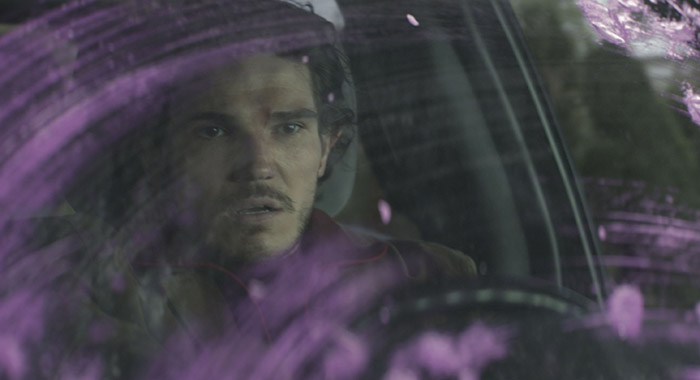
(Photo by Marvel Studios)
Erik Amaya for Rotten Tomatoes: So even though you haven’t said “bro” very often in the show so far, has it become an echo in your life yet?
Fra Fee: Despairingly so, yes. I’ll be quite happy if I never hear the term “bro” ever again [laughs]. But yeah, you’re right, Kazi doesn’t say the term “bro” very much. He’s absolutely one of them, though, they are his brothers in a deeper sense than just camaraderie. Like, this is his family unit. It’s a surrogate family. It’s all he’s ever really known. Certainly, all he really remembers and he is deeply, deeply loyal to them.
Since the rest of the Tracksuits are visually uniform, was it important for Kazi to be differentiated with the hair and the coat, at least in the first couple episodes?
Fee: Well, I, I grew the hair myself [laughs]. I was definitely a fan of [the coat] because it does set him apart from the rest of the group. He definitely is higher up in the ranking order; the only person that we have seen so far that is higher than him is Maya. That was Kazi’s own decision to stick out from the crowd a little bit. There’s also a very flattering coat in the original genesis of the character from the comic book. I think that was a nod to that, too, which I was all for. It also helped whenever we were shooting in New York in minus freezing temperatures. I was thrill to have it.
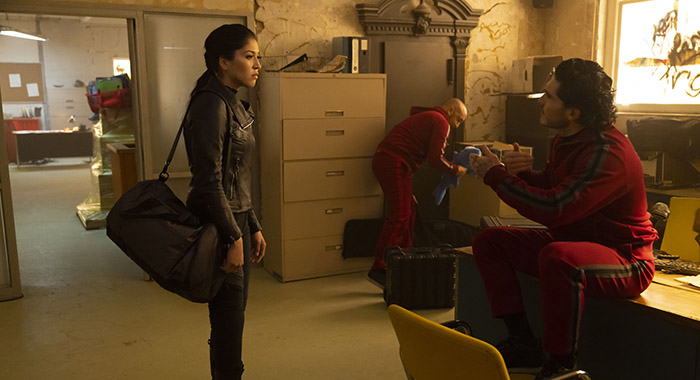
(Photo by Chuck Zlotnick/Marvel Studios)
We saw Kazi in a tracksuit in the most recent episode, was it comfortable?
Fee: They’re extremely comfortable. It’s like working in your pajama bottoms, genuinely. I was thrilled that it was our regular work wear. If anything, the coat was sometimes a wee bit restricting. Those tracksuits, man, are like working in your jammies, it’s great.
As you mentioned, the character is from the comic, but he is fairly different here on the show and for you, as an actor, how much value was there in going back and taking a look at his handful appearances in that run of Hawkeye?
Fee: Whether it’s on stage or screen or whatever, I’m always a big fan of looking at the source material, regardless of whether it manages to manifest itself in the end result. I think it’s always interesting to know the character was initially created. I certainly was able to extract lots of things about the comic book character [like] his brooding intensity and real sort of distilled mania. There’s a lot simmering underneath the surface, which I love. It’s great to have so many harboring secrets, you know, and not give too much away, which also sets him apart from the slightly more larger than life characters of the TSM.
And yeah, our version is certainly different. I was able to suss out a lot more backstory for this character, trying to figure out how it is that he’s able to kill people and be a criminal, and what led him to that, to that place. It’s such a fascinating question when you’re talking about good and evil and like how it happens. And Marvel’s always been such wonderful storytellers in dealing with those subjects. It’s not quite as straightforward as one being inherently good and one being inherently evil. Like we’ve just seen in this story, Clint went through a period of his life just dealing so terribly with grief that he became a pretty evil guy for a few years. That dichotomy and that contrast is so beautifully done in these stories. And I wanted to explore that myself with Kazi.
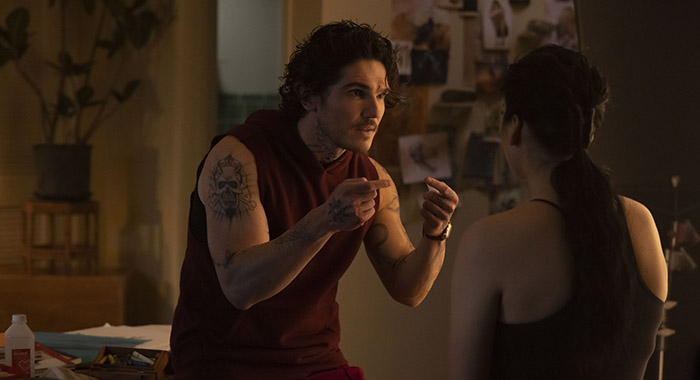
(Photo by Chuck Zlotnick/Marvel Studios)
Building off of that, were you surprised by how sympathetic he seems to be? Going by the most recent episode, he really is the person most sympathetic to Maya’s plight and possibly the only one who could actually talk her down.
Fee: No, not really because the first thing that we wanted to unfold and unpack was the relationship with Maya. What is it? They don’t meet in the comic books. This is something that we were able to explore and find for ourselves. And it turns out that [their TV counterparts] actually have a deep connection, possibly even more so than the viewers understand at the moment — [although] some very astute ones have picked up at Kazi was also there in the karate class. So, they’ve known each other since they were kids. They have a very close familial bond, certainly.
And it’s that lifelong dedication and love — I think that is a perfectly warranted word there — it’s that level of commitment and loyalty to one another that puts him in the dilemma that he is with Clint in the car. I think, ordinarily, he wouldn’t be listening to the dude. But when Maya’s safety is threatened, that makes it very tricky. But whether or not he’s actually able to convince her to take her foot off the pedal in this quest for vengeance, it doesn’t seem likely at the moment. She seems pretty … [laughs]. We just have to see.
Since Marvel keeps so many things close to the vest, how much do you know get to know ahead of time so you can work out these relationships or aspects of history that the characters would know, but may be a revelation for the audience in a later episode?
Fee: I was always a bit of a nagger on set for scripts, to be honest. I just find it very hard to fully do my job [without full scripts]. I mean, I guess most actors would say that. I did get scripts, [but] there were constant revisions. I think we ran out of colors of the rainbow to call each script because they constantly changing. And even now the story is evolving in posts. There’s elements of the story that I felt as though I wasn’t particularly privy to. And so I don’t really know exactly where we’re going [in certain parts]. That’s part of the ride for me, but I certainly tried to figure out as much as possible. They’re very, very good at keeping their cards very close to them [laughs].
Is that the biggest difference between working on something like this and doing a movie or acting on stage?
Fee: It’s certainly one of the main differences. You feel as though you’re in something that is existing in real time, and that anything can change and the future is completely not predicted. It is not set in stone in a way that, you know, if you go to rehearse your play or any other movie, that’s where the script was written ages and ages go. We’ve got writers and sets and we’re changing things. [They can] look back at the whole picture and if it’s not quite right, they will fix it. And they will figure out where this story was always meant to go in the first place. That’s utterly thrilling as an actor who’s also a fan — that is the best fun ever.


